Business
Use Cases and Benefits of AI Analytics for Businesses
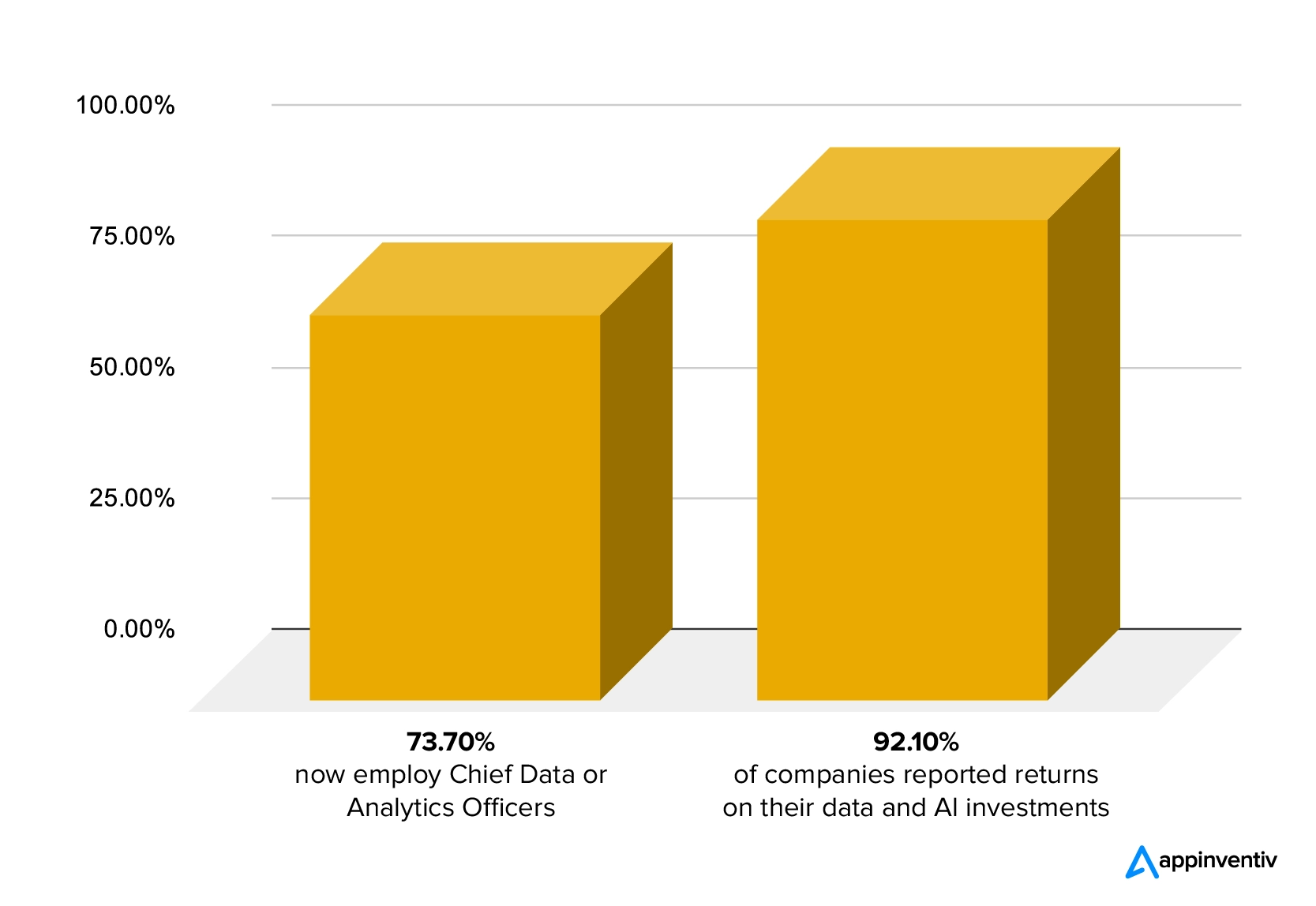
The implementation of AI is pervasive across all industries, bringing a shift in how businesses operate and innovate. Its applications range from cost reduction and error prevention to improved customer assistance, efficiency improvement, and routine task automation.
One significant advancement in this AI-driven expansion is the emergence of revolutionary technologies such as generative AI. This new frontier opens up new possibilities for data-driven decision-making in enterprises and expands the application of AI analytics. AI’s trajectory promises innovative solutions to complex problems as it continues to develop, highlighting its critical role in forming the modern business environment.
In this curated blog, we will study the need and importance of AI-based analytics for businesses, its benefits, use cases, and real-life examples of prominent brands. Let’s take a quick walkthrough.
The Importance of AI Analytics for Businesses
A survey by NVP reflects the strategic changes businesses have made to become data-driven organizations. These changes have included a move from data management to Big Data and, most recently, AI and analytics. Interestingly, 73.7% of companies now employ Chief Data or Analytics Officers, a notable increase from 12.0%, as recorded in 2012. The survey also indicates a noteworthy trend, with 92.1% of companies reporting returns on their data and AI investments in 2024, a significant rise from 48.1% in 2017.
Overall, this report sheds light on how businesses strategically use AI analytics to boost efficiency and innovation. AI analytics is critical to the contemporary business landscape since it revolutionizes decision-making and ensures operational effectiveness.
Businesses can obtain previously unattainable insights by using AI algorithms to examine large datasets, facilitating strategic planning and well-informed decision-making. By forecasting market trends, AI predictive analytics maximizes the use of available resources. AI-powered analytics improve risk assessment and individualized patient care in industries like finance and healthcare.
In addition to streamlining procedures, this revolutionary tool gives organizations the flexibility they need to adapt to a constantly changing marketplace. AI analytics can transform how businesses function, encourage innovation, and provide a competitive advantage in today’s fast-paced business environment.
Also Read: How Cloud Analytics Helps Businesses Make Data-Driven Decisions Faster
AI Analytics vs Traditional Data Analytics
AI analytics represents a transformative evolution beyond traditional data analytics methods. While both approaches aim to extract valuable insights from data, they differ significantly in their capabilities and methodologies. Here’s a quick comparison:
| Aspect | AI Analytics | Traditional Data Analytics |
|---|---|---|
| Data Type | Capable of handling both structured and unstructured data, providing a more thorough analysis | Ideal for structured searches and organized data |
| Methodology | Leverages machine learning algorithms, NLP, and deep learning for more dynamic and adaptive structured and unstructured data analysis | Mostly uses structured data analysis and pre-written queries |
| Insight Generation | Finds insights through real-time detection of intricate patterns, trends, and anomalies while adjusting to shifting data dynamics | Produces insights using predefined patterns and previous data |
| Human Involvement | Minimizes the need for human involvement, freeing analysts to concentrate on more complex decision-making duties | Requires a large amount of human intervention to formulate queries and analyze results |
| Flexibility | Incredibly flexible and capable of self-adjusting to changing trends and patterns in data | Restricted capacity to modify new data patterns manually |
| Use Cases | Enables forecasting and proactive decision-making by expanding to predictive and prescriptive analytics | Often used in diagnostic and descriptive analytics |
The above table highlights the key distinctions between advanced AI analytics and traditional data analytics. For a deeper exploration and understanding of the evolving landscape of data analytics, you can refer to our comprehensive guide on data analytics.
Benefits of AI Analytics for Business
Businesses can reap several benefits from AI analytics as it transforms decision-making processes and boosts overall operational effectiveness. Let’s check those out.
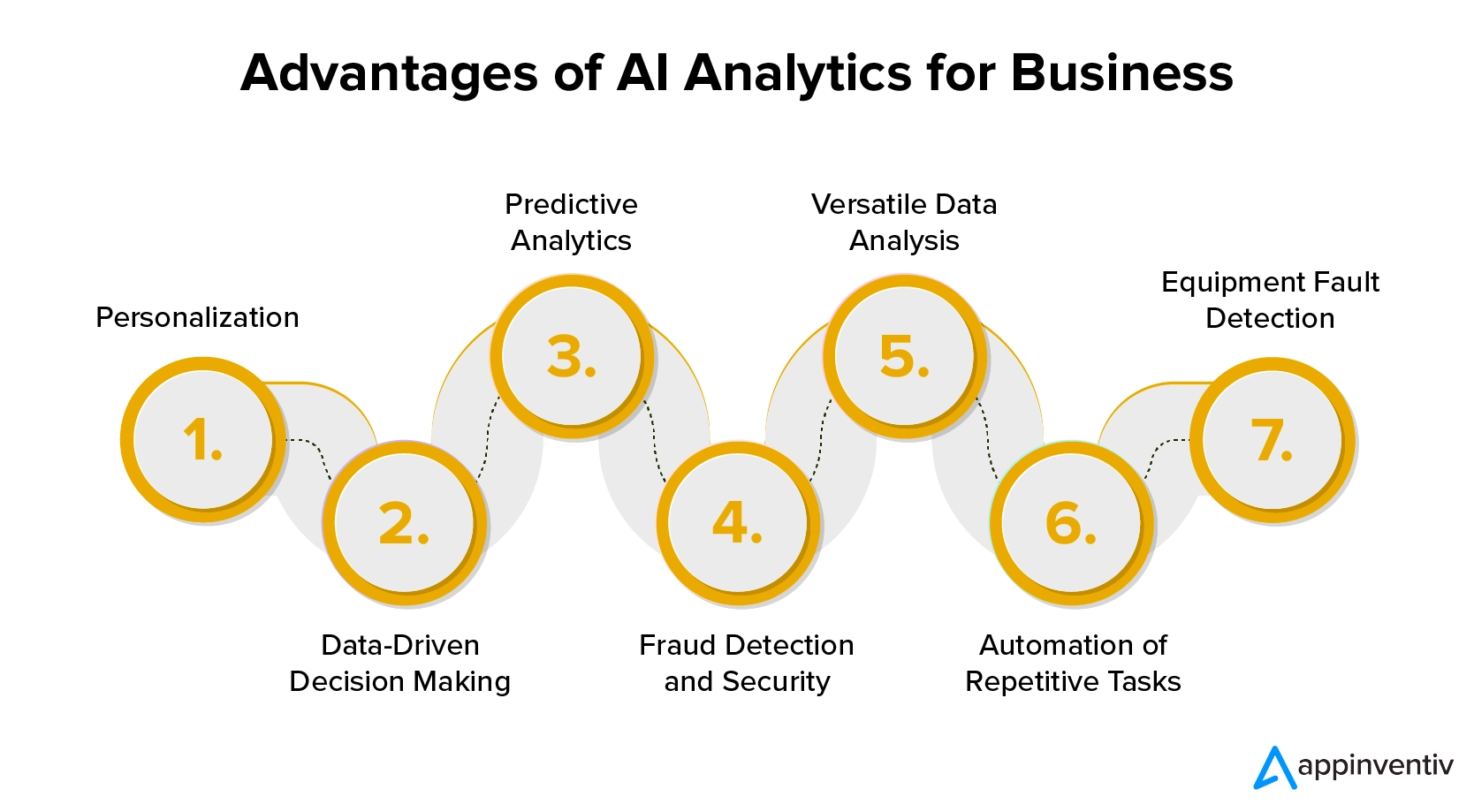
Personalization
AI analytics uses machine learning algorithms to react dynamically to changing customer preferences, going beyond simple analysis. AI analytics helps understand unique user behaviors by continuously extracting information from user interactions, enabling companies to provide hyper-personalized experiences.
The precise understanding obtained from AI data analytics facilitates the development of customized marketing strategies, guaranteeing that every customer engagement is pertinent and captivating. AI’s capacity to forecast consumer preferences solidifies its position as a driver for companies looking to surpass customer expectations in a market that is becoming more and more competitive.
Data-Driven Decision Making
AI analytics solutions can quickly scan large datasets and identify important patterns and connections that conventional statistical methods would miss. Its capacity to recognize complex data patterns enables companies to find untapped possibilities and possible challenges. Furthermore, the iterative nature of AI-powered analytics guarantees steady advancement in decision-making precision.
An agile and responsive business strategy, facilitated by adaptive learning, is crucial in navigating changing market dynamics. Ultimately, AI analytics’ speed, ability to identify patterns, and potential for ongoing improvement make it a vital tool for any organization looking to prosper in the data-driven business environment.
Predictive Analytics
AI’s predictive data analysis extends beyond the mere identification of market trends. It adopts a strategic approach to understand and optimize business operations comprehensively. AI in data analytics not only evaluates possible risks and opportunities but also anticipates changes in consumer behavior and industry trends by utilizing past data patterns.
Predictive analytics empowers businesses to take preventative action and mitigate potential risks. Moreover, AI systems’ flexibility allows them to improve projections, guaranteeing forecast accuracy in changing circumstances continuously. Being proactive improves strategic decision-making, allowing companies to remain ahead of the curve, seize new opportunities, and precisely handle challenges.
Fraud Detection and Security
Artificial intelligence analytics acts as a defender in the financial industry, using sophisticated algorithms to identify complex patterns indicative of fraudulent activity. Because of its real-time monitoring capabilities, transaction irregularities can be quickly identified, providing dynamic protection against ever-evolving cyber threats.
Leveraging AI in analytics can help identify fraud prevention strategies, increasing the resilience of security measures. This strengthens AI’s position as a vital ally in protecting the financial sector from cyber threats and fraudulent schemes.
Also Read: 10 Ways in Which AI is Revolutionizing the Financial Sector
Versatile Data Analysis
Artificial Intelligence in data analytics broadens its scope to include complicated and unstructured datasets. This flexibility allows businesses to extract insights from structured databases and sources like text, photos, and multimedia.
AI for data analytics offers a more comprehensive insight into operations, markets, and customer behavior by supporting various data formats. This adaptability is especially helpful in sectors where data is available in various formats, allowing for a more thorough and intricate approach to strategic planning and decision-making.
Equipment Fault Detection
Businesses are utilizing artificial intelligence’s capabilities to scan large datasets and identify trends for defect detection and predictive maintenance. By utilizing AI in data analytics, it becomes possible to predict machinery faults or maintenance needs by closely examining equipment sensors and previous data.
By utilizing AI for fault detection, businesses can seamlessly schedule maintenance, which minimizes costly downtime and maximizes operational efficiency. Predictive maintenance using AI improves equipment reliability and serves as a strategic asset for numerous sectors, guaranteeing efficient operations and economical maintenance procedures.
Also Read- How is AI in Business Bringing Transformation?
AI Analytics in Business – Use Cases and Real-Life Examples
AI analytics’s numerous uses are revolutionizing businesses in various industries. These use cases demonstrate the critical role of AI and data analytics in transforming processes and decisions in several business sectors. Let’s explore some real-life examples of AI analytics for businesses:
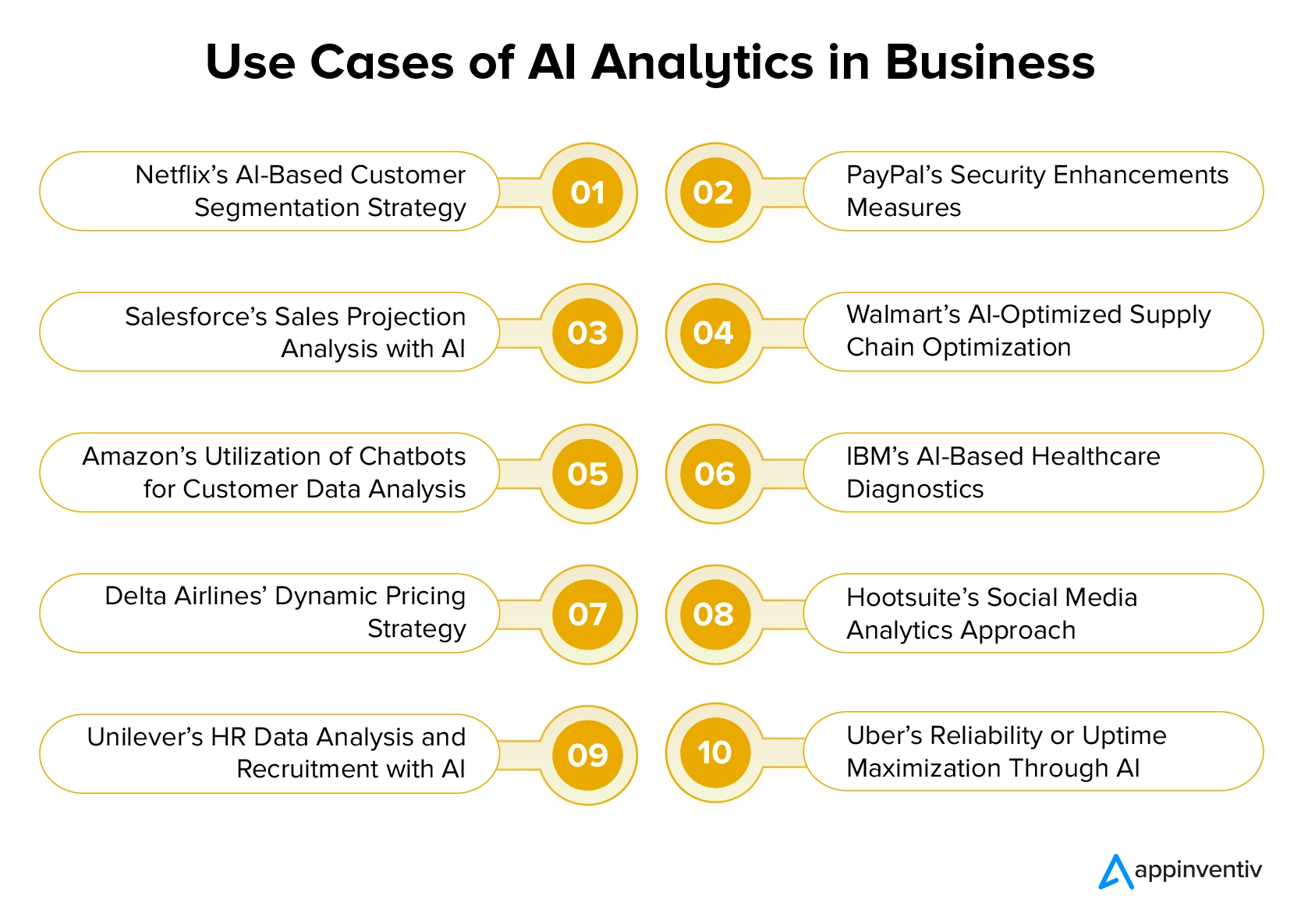
1. Netflix’s AI-Based Customer Segmentation Strategy
Customer segments can be created using AI data according to their demographics, preferences, and behavior. By using segmentation, organizations can improve client satisfaction and retention by providing distinct customer groups with individualized experiences, focused marketing efforts, and product suggestions.
For instance, Netflix divides its user base into various groups using AI analytics to examine user behavior, including viewing history and preferences. This boosts customer satisfaction and engagement by enabling them to offer tailored suggestions for movies and web series.
2. PayPal’s Security Enhancements Measures
Real-time AI analytics in finance can identify patterns of fraudulent activities. Businesses can lessen financial losses and improve the security of financial systems by promptly identifying and stopping fraudulent transactions. This can be done by closely monitoring and comparing them to pre-established patterns.
PayPal, for instance, uses artificial intelligence to recognize and stop fraudulent transactions instantly. PayPal’s AI system examines user behavior, transaction patterns, and other pertinent data through advanced algorithms and machine learning models to promptly identify anomalies or suspicious activity.
It helps PayPal reduce the likelihood of financial fraud with users and the platform by taking prompt action, such as stopping or flagging transactions. In addition to improving the security of financial transactions, the real-time aspect of this AI-driven fraud detection helps retain users’ confidence and trust in PayPal’s services.
At Appinventiv, we worked with Bajaj Finserv, a leading Indian FinTech enterprise, helping them solve their security challenges. We utilized advanced security methods to prevent and predict financial fraud. This helped them increase their merchant onboarding to 300+, ensuring 3 lacs+ transactions per day.
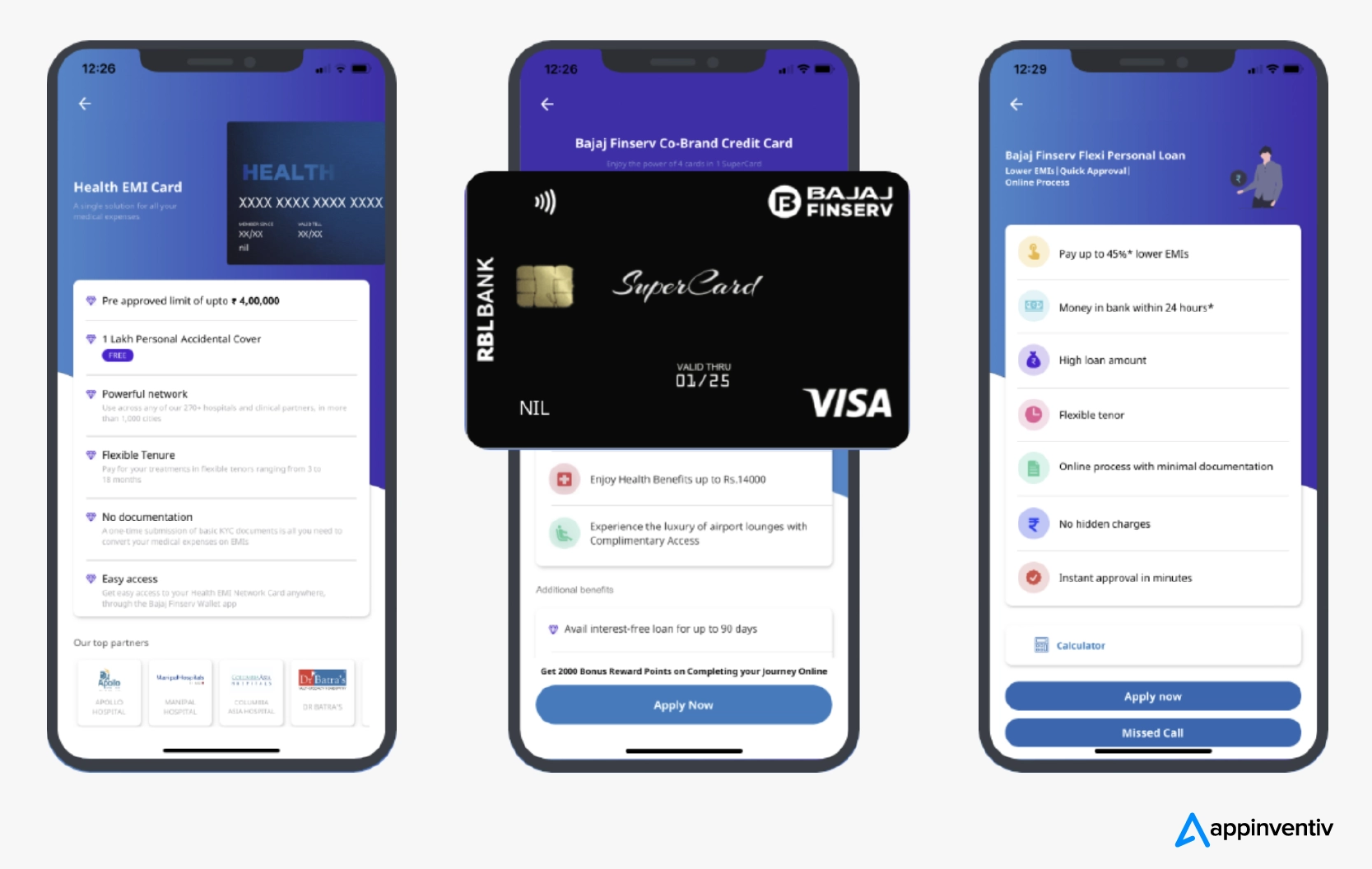
3. Salesforce’s Sales Projection Analysis with AI
Predictive analytics forecasts future sales by utilizing market trends, customer behavior, and past data. This aids companies in resource allocation, marketing strategy planning, and inventory optimization. It lessens the effects of erratic market conditions and helps in quick decision-making.
Salesforce, for instance, uses artificial intelligence-driven data analytics to prioritize leads for sales teams and forecast sales trends. Sales forecasting, pricing optimization, and potential upsell chances are all aided by Salesforce’s Einstein Analytics, which analyzes past data, current market conditions, and customer behavior.
4. Walmart’s AI-Optimized Supply Chain Optimization
AI analytics for businesses helps organizations analyze enormous volumes of data involving logistics, demand, and inventory levels to optimize the supply chain. By using data for a better decision-making process, businesses can optimize transportation routes, change production schedules, and save money while increasing overall efficiency.
For instance, Walmart utilizes the power of AI insights to optimize its supply chain. Through meticulous analysis of inventory levels, product demand, and transportation logistics, Walmart increases operational efficiency and cuts costs. Also, it helps Walmart ensure continuous stocking of products in stores, guaranteeing a streamlined and customer-centric shopping experience.
At Appinventiv, we helped a global manufacturing company enhance its operational efficiency by deploying an efficient supply chain management solution. This resulted in a 60% increase in supply chain visibility, a 30% rise in operational efficiency, and a 40% reduction in transportation costs.
5. Amazon’s Utilization of Chatbots for Customer Data Analysis
Enterprises widely use AI chatbots for customer support services, offering real-time, and round-the-clock client service. In addition to assisting users with troubleshooting procedures and, if necessary, elevating complex issues to human agents, they can respond to commonly asked inquiries through their AI analytics capabilities. This increases the effectiveness of customer care, speeds up response times, and improves the general customer experience.
Amazon, one of the biggest eCommerce technologies, has effectively incorporated AI chatbots into its customer support services, which has also helped them overcome manual data analysis challenges. AI chatbots can analyze data faster than humans, which ensures that customers always get timely assistance. Leveraging AI analytics capabilities, chatbots can analyze consumer behavior and offer users personalized recommendations.
6. IBM’s AI-Based Healthcare Diagnostics
Medical experts can diagnose illnesses and offer personalized treatment options using AI analytics in healthcare. AI systems can offer insightful analysis of a large volume of clinical trial data, patient information, and medical journals. This analysis helps healthcare providers provide more precise and timely care.
For instance, IBM Watson uses AI analytics for Oncology to help oncologists diagnose and treat cancer. Based on the unique illness trait of each patient, Watson can prescribe a specific course of treatment by reviewing clinical trial data, medical literature, and patient information.
Appinventiv has successfully implemented AI in healthcare with projects like YouCOMM, an in-hospital patient communication system. With YouCOMM, patients can communicate in real-time with nurses and other hospital staff. The platform has a user-friendly interface that incorporates voice commands and other manual alternatives like head movements.
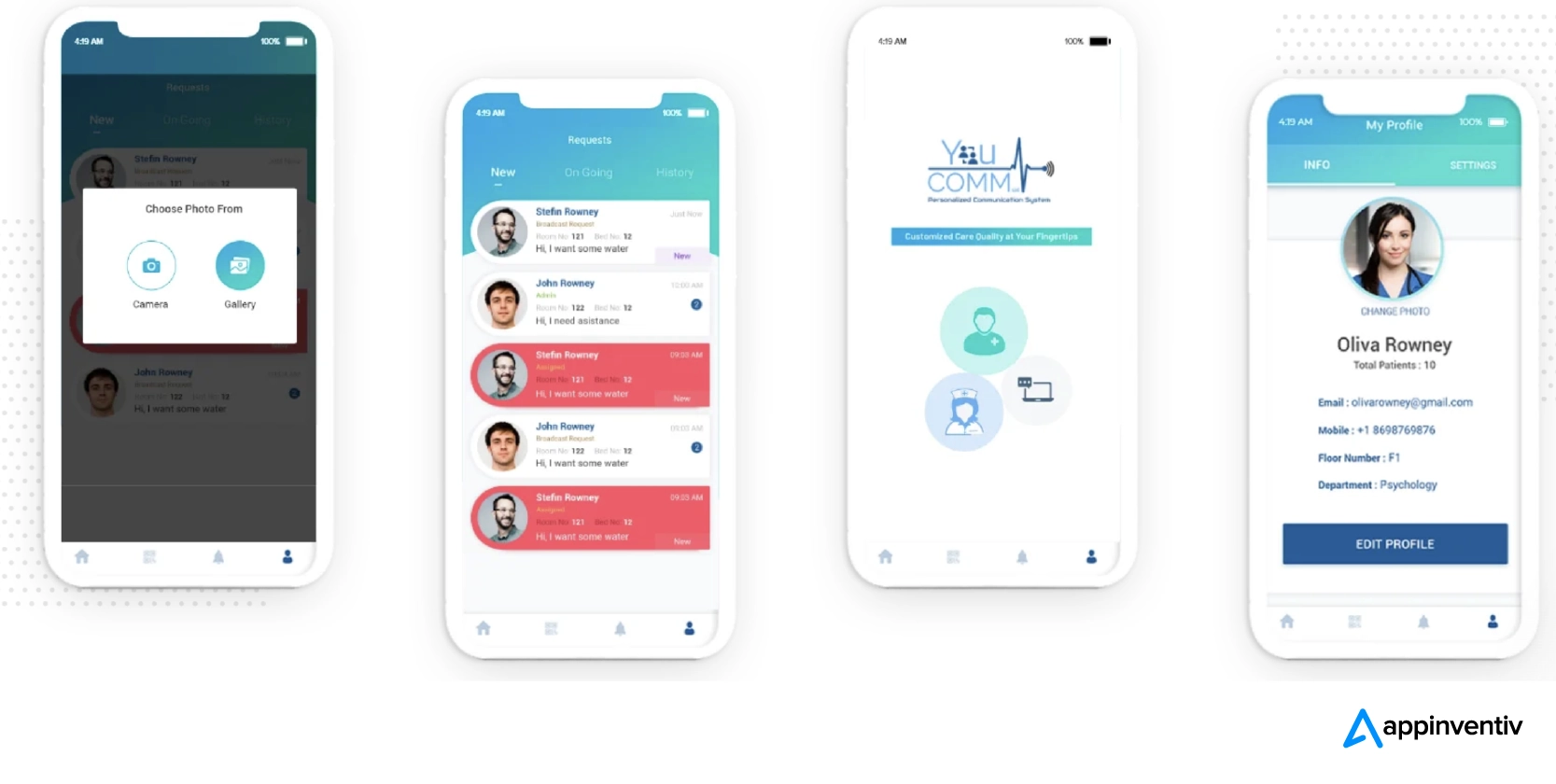
YouCOMM has significantly improved the efficiency of patient-staff contact and allowed hospital administration to maintain thorough records of the timelines with which patients’ requests are completed. The effectiveness of this solution led to its adoption by over 5 hospital chains in the US, resulting in a significant 60% increase in nurses’ real-time response rates.
7. Delta Airlines’ Dynamic Pricing Strategy
Dynamic pricing algorithms analyze competitor pricing, market conditions, and customer behavior to adjust prices in real time. This approach increases revenue by capitalizing on demand variations, providing discounts when demand is low, and optimizing pricing strategies according to various criteria.
Delta Airlines utilizes AI and data analytics to structure its dynamic pricing strategy. The airline can modify ticket rates in real-time to optimize revenue and fill available seats by evaluating the demand, time to departure, and competitor pricing.
8. Hootsuite’s Social Media Analytics Approach
Businesses can better understand their online presence by using AI analytics in social media. Sentiment analysis, for example, determines public opinion on a particular product or brand. These insights help organizations improve engagement, hone their social media strategies, and effectively address client feedback.
For example, Hootsuite uses AI analytics to examine user engagement and social media trends. The platform analyzes sentiment, audience behavior, and the success of social media campaigns using machine learning algorithms.
Also Read: How to Create a Social Media App in 2023 – A Comprehensive Guide
9. Unilever’s HR Data Analysis and Recruitment with AI
AI-powered HR analytics automates applicant matching and resume screening, which expedites the hiring process. This frees HR personnel to concentrate on more strategic hiring tasks like conducting in-depth interviews and determining cultural fit. AI analytics can also aid staff retention by pinpointing the elements influencing job satisfaction.
For example, Unilever uses AI analytics in its hiring process. The business uses AI algorithms to evaluate resumes and find suitable applicants based on their credentials and skill sets. This facilitates the hiring process and helps identify candidates who are best fit for open positions.
10. Uber’s Reliability or Uptime Maximization Through AI
Maintaining uninterrupted operations is more important in a fast-paced world of digital services. Downtime or interruptions can seriously affect organizations trying to fulfill customers’ ever-increasing needs. These consequences can affect customer satisfaction, trust, and the entire company’s reputation.
Uber, a leader in the ride-sharing space, depends on AI to guarantee maximum reliability and uptime. AI systems continuously monitor and analyze enormous databases, seeing possible dangers, inefficiencies, and disruptions in real-time. Uber’s AI-driven analytics method improves platform reliability by proactively addressing issues. In addition to preventing service disruptions, this also lessens the possibility of accidents, hacking, and human error.
Uber’s use of AI in its operations is a prime example of the revolutionary effect on uptime and reliability. It demonstrates how this state-of-the-art technology can improve user experiences and maintain the smooth running of services in the constantly changing digital landscape.
Also Read- AI in Business: A Comprehensive Integration Guide
Navigating Challenges and Considerations in Implementing AI Analytics for Businesses
Implementing artificial intelligence-driven data analytics comes with several complex challenges that can be tackled with proper considerations or solutions. Let’s check those out:
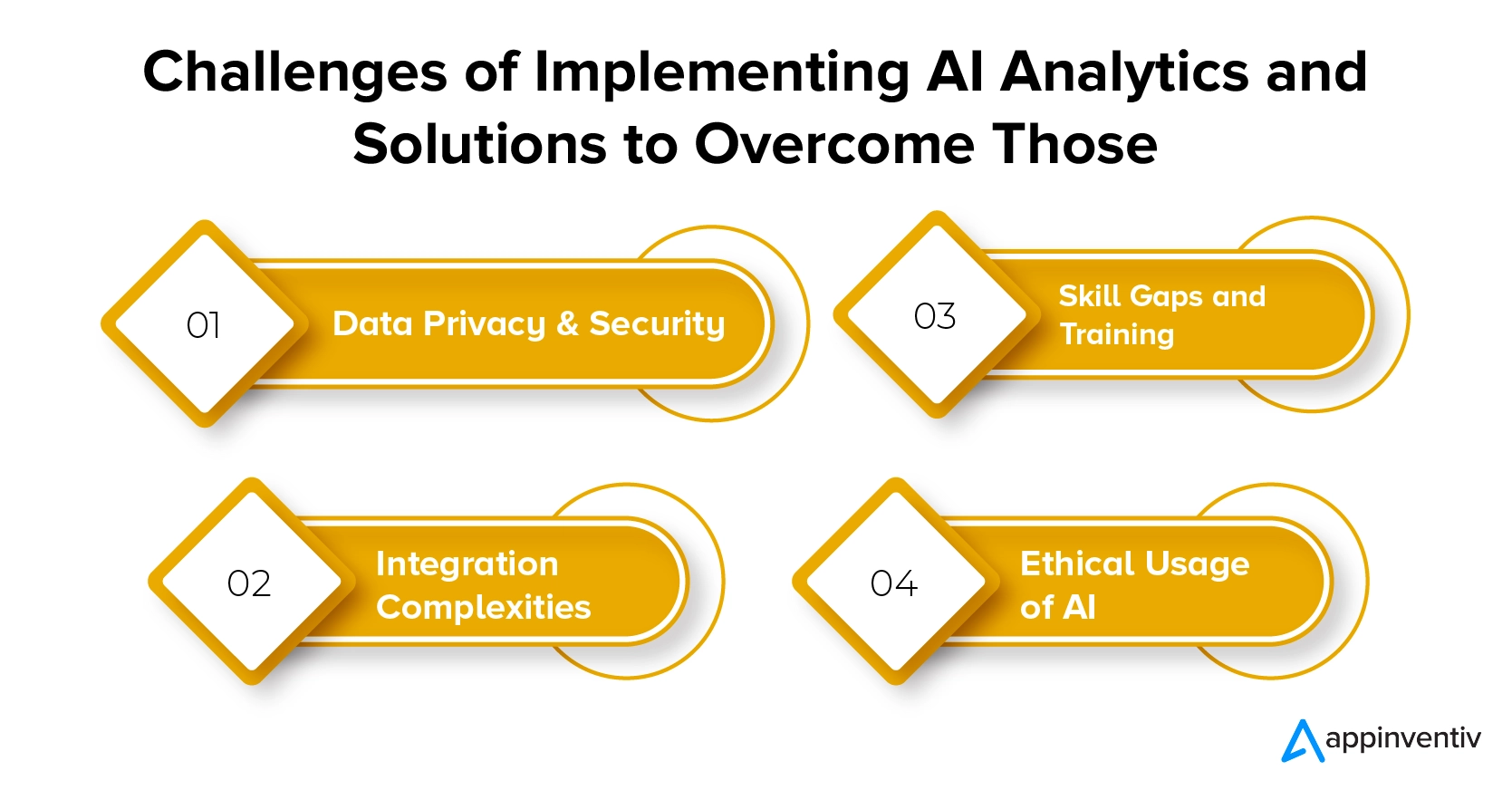
Data Privacy and Security
As data analytics and AI become increasingly significant, concerns about sensitive data security and privacy are growing. The use of enormous datasets presents certain concerns as firms incorporate AI into their operations, such as abuse, unwanted access, and data breaches. The challenge lies in protecting this data from ever-changing cyber threats. Resolving these issues is critical to building trust with stakeholders and users, requiring strong steps to reinforce data privacy and security systems.
Solution: Adopt anonymity strategies, put strong encryption techniques into place, and follow stringent compliance guidelines like GDPR. Frequent evaluations and audits can guarantee data security, and open privacy practices foster user trust.
Integration Complexities
Many intricate components are involved in integrating AI analytics into well-established business processes. Integration challenges arise because firms’ current infrastructures frequently run on multiple platforms and technologies. Compatibility issues, data discrepancies, and disruptions might result from this complexity. These issues must be resolved to fully utilize AI analytics for businesses without interfering with regular operations and to guarantee a smooth and harmonious integration into the organizational structure.
Solution: The best course of action is to invest in interoperability standards, plan for a phased integration strategy, and thoroughly evaluate the current infrastructure. Hiring an experienced software development team ensures a smoother integration process, guaranteeing efficiency in your project.
Skill Gaps and Training
The lack of qualified experts in creating, deploying, and overseeing AI analytics solutions prevents this game-changing technology from being widely used. There is a critical shortage of specialized AI talents since demand exceeds the available talent pool. This challenge affects people in various fields, including data scientists and AI developers.
Solution: Invest in extensive training programs to help current employees become more proficient with AI. Establish partnerships with educational institutions to develop a talent pool for artificial intelligence. Additionally, consider working with AI providers or utilizing managed IT services to compensate for talent gaps and guarantee businesses’ successful adoption of AI analytics.
Ethical Usage of AI
Handling the intricacies of bias, transparency, and potential misuse is necessary to ensure the ethical deployment of AI. Creating algorithms and models that are ethically sound and devoid of biases is the challenging part.
Solution: Ensure AI development teams conduct regular audits of algorithms for bias and foster continuous discussions on ethical AI practices inside the company and across the industry.
Embrace AI-Powered Analytics for Your Business with Appinventiv
AI analytics for businesses is changing industries and operational paradigms in various areas, including manufacturing, retail, healthcare, finance, and marketing. Innovative artificial intelligence business ideas for startups harness the power of artificial intelligence to revolutionize industries. Leveraging AI in business analytics can help in better decision-making processes, predict future trends, uncover hidden insights, automate complex data analysis, and analyze various data sources.
Unlock the power of sophisticated analytics, improve decision-making, and grow your business skills with Appinventiv’s AI analytics services. Our customized AI services are made to push your business toward steady expansion and guarantee a forward-thinking strategy for realizing the full potential of AI in achieving success.
Whether it’s predicting market trends, personalizing customer experiences, or enhancing operational efficiency, our artificial intelligence development services are crafted to meet the unique needs of your business.
Explore the transformative realm of AI analytics for businesses by connecting with our experts today.
FAQs
Q. How is AI analytics used for businesses?
A. Businesses across different sectors utilize AI analytics to enhance decision-making processes, extract valuable insights, and optimize operations. The use of AI analytics for businesses is reflected in these examples:
- Data processing and analysis
- Quality control
- Supply chain optimization
- Employee productivity
- Predictive analytics
- Personalization
- Fraud detection
- Competitive analysis
- Risk management
Q. What is the future of AI analytics for businesses?
A. The future of AI in business is expected to continue to advance toward more complex and personalized insights. Businesses can expect enhanced predictive capabilities as AI technologies develop, offering greater insights into consumer behavior, market trends, and possible hazards. The widespread adoption of automation and increased efficiency will permeate various sectors, integrating AI insights into daily decision-making processes.
AI’s influence will increase when combined with other cutting-edge technologies like edge computing and the Internet of Things (IoT). The increasing prominence of ethical considerations and responsible AI techniques will ensure the appropriate and transparent use of data. Overall, AI analytics will become an invaluable asset for businesses in the coming years, fostering innovation and industry competitiveness.
Q. What is the role of AI analytics in a business?
A. AI analytics offers a transformational impact on the decision-making processes and other pivotal operations of businesses. By leveraging AI algorithms, businesses can attract valuable insights from huge datasets that help them enhance overall efficiency.
AI-powered analytics for business help improve the resource allocation processes, facilitate personalized customer experiences, and reduce costs by identifying the inefficiencies within the organization. It also helps businesses remain agile and responsive in the ever-changing market dynamics. Overall, it helps organizations in navigating complex business challenges.
Business
Microsoft to Spend Heavily on Own Chip Cluster for in-House AI Models

Microsoft is planning to make “significant investments” in its own AI chip cluster to become “self-sufficient in AI,” Microsoft AI CEO Mustafa Suleyman said during an all-employee town hall meeting on Thursday.
Microsoft’s AI strategy has so far largely relied on a partnership with OpenAI, although the companies appear to be drifting apart lately and they’re locked in tense contract renegotiations right now.
Suleyman’s comments suggest Microsoft wants to forge its own path in AI, while still supporting OpenAI with cloud-computing services.
“It’s critical that a company of our size, with the diversity of businesses that we have, that we are, you know, able to be self sufficient in AI, if we choose to,” Suleyman said.
Instead of relying solely on OpenAI, Microsoft is using open-source models, partnering with other AI developers, and building its own models, Suleyman said.
The software giant unveiled MAI-1-preview in late August. This is Microsoft AI’s first foundation model trained end-to-end by the company, and offers a glimpse of future offerings inside its Copilot service. This model ranks 24th among text models on LMArena, a widely followed leaderboard, so Microsoft has a lot of work to do still.
“We should have the capacity to build world class frontier models in-house of all sizes, but we should be very pragmatic and use other models where we need to,” Suleyman said.
Microsoft plans to make “significant” investments in its own AI chip cluster to help the company build its own models, he added.
Suleyman noted that MAI-1-preview was only trained on 15,000 Nvidia H100s, which he said was a “tiny cluster” in the grand scheme of things. Competing models from Google, Meta, and xAI were all trained on clusters that were six to 10 times larger in size, Suleyman said.
Microsoft has significantly benefited from its arrangement to access OpenAI’s intellectual property, both by selling it to customers through the Azure OpenAI service and creating its own products using OpenAI’s technology, like its AI assistant Copilot. Those terms are under renegotiation now that OpenAI needs Microsoft’s blessing for a corporate restructuring.
Microsoft CEO Satya Nadella during the town hall reassured employees that the company still benefits from the partnership.
“We have a very good partnership with OpenAI. We’re very excited to continue to work with them, support them. Remember, OpenAI supplies to us. We supply to them. So they’re each other’s customers. We have a commercial partnership. We are investors,” Nadella said. “And at the same time, we were very clear that we also want to build our own capabilities.”
Have a tip? Contact this reporter via email at astewart@businessinsider.com or Signal at +1-425-344-8242. Use a personal email address and a nonwork device; here’s our guide to sharing information securely.
Business
Spain’s digital business school ISDI & Microsoft bet on AI in executive MBAs •

Keep up to Date with Latin American VC, Startups News
At a time when artificial intelligence (AI) is redefining work, ISDI, Spain’s digital business school, and Microsoft have formed an alliance to incorporate the real-world use of generative AI into executive training.
According to Microsoft’s Workplace Trends Report, 50% of executives in countries like Spain believe that training their teams in the use of AI will be key in the next five years.
For this reason, ISDI says it is seeking to connect theory and practice in an academic environment that adapts to the challenges of digital transformation.
Microsoft, for its part, brings its technological expertise so that artificial intelligence becomes a tangible, competitive resource for MBA grads.
“We want to train complete professionals, capable of leading business transformation in a context marked by AI,” said Basola Vallés, Executive Director of ISDI, through a press release.
The business school has faculty and alumni from around the world, including Latin America, and has an international campus in Mexico.
Creating AI Agents
The module, titled Crea tu Agente IA (Create your AI Agent), unfolds over five milestones in the master’s degree: from agent activation in Microsoft’s Copilot Studio, to application in real projects, simulation of strategic scenarios and career development.
Upon completion, each participant will have a trained and operational AI agent ready to accompany the student beyond the classroom. This practical approach contrasts with theory-focused programs by integrating AI into the day-to-day work life.

With this initiative, the Executive MBA in Business and Technology (MIB) is positioned as the first Executive MBA in Spain to structurally integrate business, technology, artificial intelligence and human development, according to the university.
Paco Salcedo, president of Microsoft Spain, added: “Our technology is designed for students to turn AI into a real advantage for their organizations”.
The proposal is reinforced with a project linked to business challenges and with an employability component.
A study by LinkedIn and Microsoft reveals that professionals who mention AI in their profiles are 17% more likely to be considered in selection processes.
The impact of the program has already been recognized by several media, which places it amongst the most influential executive master’s programs in Spain.
MIB graduates record an average salary increase of 38% in the year after graduation and 70% job mobility, according to figures shared with Contxto that reflect how the combination of business, technology and now generative AI can transform a career path.
According to a report published by Intel and analyst firm IDC, just 14% of Latin American companies have adopted AI agents in their work processes, putting the region in need of adapting to today’s challenges.
This trend of MBA programs that prioritize the use of generative AI could help to motivate future business leaders in the region and will hopefully boost the adoption figures of this technology in the coming years.
Keep up to Date with Latin American VC, Startups News
Business
Innovative AI Solutions Transforming Business Operations and Customer Interactions

Fulcrum (www.fulcrumapp.com) field-focused process and data collection platform for geospatial field processes and data collection recently launched Audio FastFill, a voice-powered, multi-field AI data collection tool.
It integrates advanced AI within the platform to create a textual scribe for field teams, eliminating inefficiencies of manual entry, and allows users in the field to dictate forms naturally and produce richer more actionable data input, with the system understanding and accurately populating fields.
Fulcrum dynamically understands context to populate complex fields like picklists and conditional logic, eliminating inefficiencies of manual entry and simplifying workflow, helping ensure ease of use in demanding environments. It can also dissect one continuous audio file to place all of the information into the correct corresponding fields and input to fields that aren’t text, like numbers or drop-down lists.
Pricing: structure not actual cost, free demo, free trial.
AIPhone
AIPhone (www.aiphone.ai) is a cross language calling app utilizing AI translation. It translates phone calls in real time—speak in your language and the other party hears it in theirs instantly and vice versa. How it works: you invite anyone via a simple link—no extra app needed for them.
The app, which supports several dozen languages and dialects, is trained to both translate words and understand the context behind them. In addition, it also supports camera translation—snap a photo or select a saved image (e.g. a sign) and get instant translation. It also translates video and voice calls in WhatsApp and other apps.
Pricing: weekly, monthly, annual plans available with free trial package available through X, TikTok, and Facebook.
ServiceMonster
ServiceMonster management software (www.servicemonster.com, 888/901-3300, covered in September 2022 column) recently introduced the ServiceMonster Payments mobile app, which features capabilities that facilitate both immediate branded invoicing that can be sent by email or text and collection of payments via credit cards, debit cards, and ACH. Suitable for solo operators and multi-crew service businesses, it has the ability to automate reminders and follow-ups. You can store cards on file securely for repeat customers or recurring billing.
ServiceMonster Payments includes built-in surcharging, allowing you to legally pass along credit card processing fees to your customers where permitted by law. Surcharging is automatically configured during setup based on your location. Most credit card and debit card transactions are deposited into your bank account in as little as two business days. The solution Payments offers an integration with QuickBooks Online and QuickBooks Desktop. A demo is available.
Plannit
Plannit (www.plannit.io), covered in August 2021 column, recently added a smart call answering system designed to function as a virtual assistant, handling calls when team members are unavailable. The system, which is available 24/7 and has multi-language support, features intelligent call routing, utilizing advanced algorithms to direct calls to appropriate departments or personnel based on predefined criteria.
Users can customize menu options and the software, which can take messages, can be programmed to answer FAQs. It can also qualify and prioritize prospective customers by asking questions and recording their answers and saving them in the messaging center as audio files. The service requires a new phone number acquired by Plannit, but calls to existing business numbers can be redirected for message taking when needed.
Gorilla Desk
Update: Gorilla Desk (www.Gorilladesk.com), initially covered in January 2025 tech column, has several new AI Agents to its platform (both desktop and mobile app) which are designed to heighten proficiency of field service management and handle customer interactions across multiple channels, including SMS, Web Chat, VOIP phone, and client portals.
The new capabilities, available on the customer portal and by text message, enable customers to book services 24/7, with the solution streamlining and automating the entire process, from inquiry to booking and confirmation, as well as route planning and optimization.
How it works: you embed your AI agent options directly on your web site and, as desired, your customer initiates the process by making contact with your embedded company AI receptionist through one of those portals, facilitating making, logging, and finding all calls without jumping among apps; the Client Portal Agent enables customers to request new work securely and view previous documents anytime. Gorilla Desk will notify you via in-app and email alerts whenever a new work request is submitted.
There are two types of AI conversations: static and dynamic. Static conversations provide general Q&As with informational responses. Dynamic conversations involve the system taking actions, such as capturing new lead info or scheduling a pending booking. (Pricing: $1.00 per completed static conversation, $1.75 per completed dynamic conversation.)
Gorilla Desk also has four new agents in the works: Kong AI (Supreme Intelligence), acting as the central intelligence, which will provide advanced analytics and generate custom reports; Mantis AI (Ops & Admin), which will automate the role of administrator and help run day-to-day operational workflows flawlessly; Atrax AI, which will help you deploy your website, aiding in page generation and optimization; Lotus AI (Customer Sentiment), which focuses on delivering analysis of customer standpoint so you know what conversations need real human attention; and SMS & Customer Portal Agents, enabling 24/7 handling of incoming customer SMS messages their conversations with your AI.
-

 Business2 weeks ago
Business2 weeks agoThe Guardian view on Trump and the Fed: independence is no substitute for accountability | Editorial
-
Tools & Platforms1 month ago
Building Trust in Military AI Starts with Opening the Black Box – War on the Rocks
-

 Ethics & Policy2 months ago
Ethics & Policy2 months agoSDAIA Supports Saudi Arabia’s Leadership in Shaping Global AI Ethics, Policy, and Research – وكالة الأنباء السعودية
-

 Events & Conferences4 months ago
Events & Conferences4 months agoJourney to 1000 models: Scaling Instagram’s recommendation system
-

 Jobs & Careers2 months ago
Jobs & Careers2 months agoMumbai-based Perplexity Alternative Has 60k+ Users Without Funding
-

 Podcasts & Talks2 months ago
Podcasts & Talks2 months agoHappy 4th of July! 🎆 Made with Veo 3 in Gemini
-

 Education2 months ago
Education2 months agoMacron says UK and France have duty to tackle illegal migration ‘with humanity, solidarity and firmness’ – UK politics live | Politics
-

 Education2 months ago
Education2 months agoVEX Robotics launches AI-powered classroom robotics system
-

 Funding & Business2 months ago
Funding & Business2 months agoKayak and Expedia race to build AI travel agents that turn social posts into itineraries
-

 Podcasts & Talks2 months ago
Podcasts & Talks2 months agoOpenAI 🤝 @teamganassi




